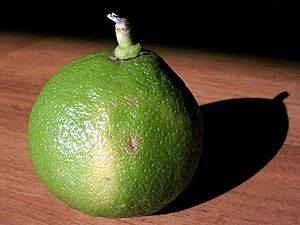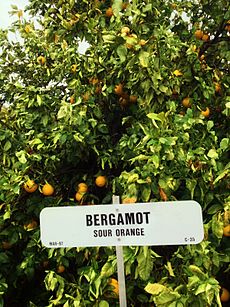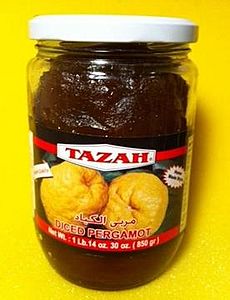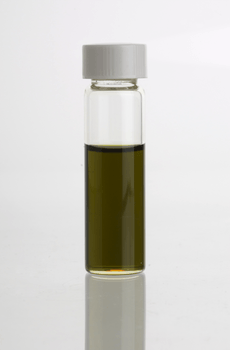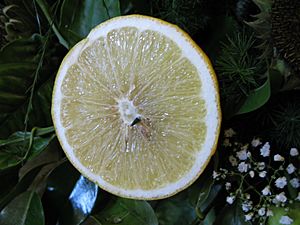Bergamot orange facts for kids
Quick facts for kids Bergamot orangeCitrus bergamia |
|
|---|---|
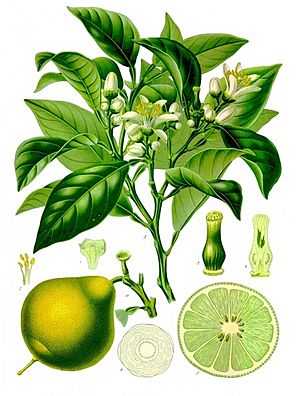 |
|
| Scientific classification |
|
| Kingdom: | Plantae |
| Clade: | Tracheophytes |
| Clade: | Angiosperms |
| Clade: | Eudicots |
| Clade: | Rosids |
| Order: | Sapindales |
| Family: | Rutaceae |
| Genus: | Citrus |
| Species: |
C. bergamia
|
| Binomial name | |
| Citrus bergamia Risso
|
|
| Script error: The function "autoWithCaption" does not exist. | |
| Synonyms | |
|
|
Script error: No such module "Check for conflicting parameters".
The bergamot orange (which scientists call Citrus bergamia) is a special type of citrus fruit. It's about the size of an orange and can be yellow or green, like a lime, depending on how ripe it is.
Scientists think the bergamot orange is a mix of a lemon and a bitter orange. People use parts of this fruit to add a nice smell and taste to food, tea, and even perfumes. But be careful! If you put bergamot oil on your skin, it can make your skin more sensitive to the sun.
Sometimes, people confuse the bergamot orange with another fruit called Citrus hystrix, which is also known as Thai Bergamot. Even though they look quite different, some products might use the wrong picture!
Contents
What's in a Name?
The word "bergamot" comes from the Italian word bergamotto. This word actually comes from Turkish, meaning "lord's pear."
What Does It Look Like?
The Citrus bergamia is a small tree that grows flowers in the winter. The juice from a bergamot orange is not as sour as a lemon, but it's more bitter than a grapefruit.
How is Bergamot Orange Related to Other Plants?
The bergamot orange is a citrus fruit. It's important to know that it's not related to the herbs also called "bergamot," like wild bergamot or bergamot mint. Those herbs are part of the mint family and are only named "bergamot" because they smell similar to the fruit.
Sometimes, the bergamot orange is thought to be a type of bitter orange. It's also sometimes confused with the citron or the "sweet lemon." And as we mentioned, it's often mixed up with the makrut lime because that fruit is sometimes called Thai bergamot. But they are not the same!
Where Does Bergamot Orange Grow?
The bergamot fruit originally comes from southern Italy. Most of it grows along the coast of the Ionian Sea in a part of Italy called Reggio di Calabria. It's so important there that it's a symbol of the whole city! The weather in this area is just right for it.
You can also find bergamot oranges growing in other countries like Argentina, Brazil, Algeria, Morocco, Turkey, and parts of South-East Asia.
Farmers usually don't grow bergamot oranges for their juice. However, in Mauritius, where it's grown on a smaller scale, local people enjoy drinking its juice.
To get bergamot oil, you need a lot of fruit. About one hundred bergamot oranges make around three ounces (85 grams) of bergamot oil.
Sometimes, cheaper oils like rosewood oil or bergamot mint oil were mixed in with real bergamot oil. To make sure people got the real thing, the Italian government started checking the oil very carefully and giving out purity certificates. This helped protect the good name of their bergamot oil.
What Is Bergamot Orange Used For?
Flavoring Tea and Other Foods
The strong-smelling oil from the skin of the bergamot orange is used to flavor famous teas like Earl Grey and Lady Grey. It's also used in candies, including Turkish delight. In Sweden, bergamot is a common flavor added to a type of smokeless tobacco called snus.
Making Perfumes Smell Good
Bergamot oil is one of the most popular ingredients in perfumes. It's loved because it can mix well with many other smells to create a wonderful blend of aromas. It was a key part of the very first Eau de Cologne made in Germany in the early 1700s.
However, sometimes the "bergamot oil" used in perfumes today actually comes from a type of mint called bergamot mint. This mint is not related to the citrus fruit at all!
Important Things to Know About Using Bergamot
When bergamot oil is put directly on the skin, it can make the skin more sensitive to ultraviolet light from the sun. This means you could get more redness or damage from sun exposure. This is true for many other citrus fruits too.
Because of this, if bergamot is used in cosmetics or perfume products, it might cause skin irritation for some people. In the past, a substance from bergamot oil was used in products meant to help people get a tan faster. But scientists later found out that this substance could increase the risk of skin problems, so it's not used for tanning anymore.
Scientists are still studying bergamot oil to learn more about its effects. It's always a good idea to be careful when using products with bergamot oil, especially if you have sensitive skin or are pregnant.
See also
 In Spanish: Bergamota para niños
In Spanish: Bergamota para niños


